A DOUBLE-DECKER H-E-B FOR MEYERLAND PLAZA 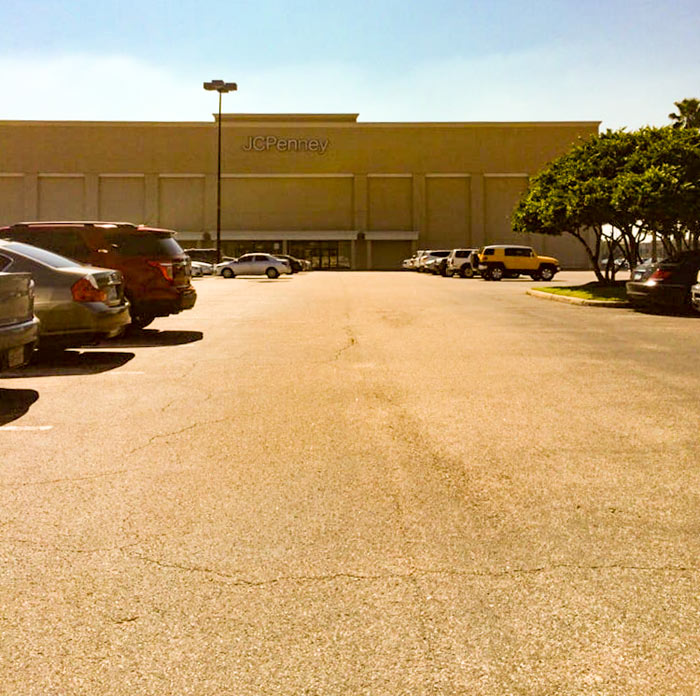 Ralph Bivins reports that grocery chain H-E-B is planning a new 100,000-sq.-ft. store on the western edge of Meyerland Plaza, near the mall-turned-big-box-collection’s JCPenney. The company announced earlier this month that it would not reopen its store at South Braeswood and Chimney Rock, which flooded after Hurricane Harvey. Stores at Meyerland Plaza, on Beechnut at 610, were damaged by flooding as well. The new structure H-E-B is planning there, Bivins says, would be 2 stories; if the configuration is similar to the company’s new Bellaire and Heights locations, that would mean the store itself would be built on the second floor, on top of a parking-only lower level. [Realty News Report; previously on Swamplot] Photo of parking lot in front of Meyerland Plaza JCPenney: Melanie H.
Ralph Bivins reports that grocery chain H-E-B is planning a new 100,000-sq.-ft. store on the western edge of Meyerland Plaza, near the mall-turned-big-box-collection’s JCPenney. The company announced earlier this month that it would not reopen its store at South Braeswood and Chimney Rock, which flooded after Hurricane Harvey. Stores at Meyerland Plaza, on Beechnut at 610, were damaged by flooding as well. The new structure H-E-B is planning there, Bivins says, would be 2 stories; if the configuration is similar to the company’s new Bellaire and Heights locations, that would mean the store itself would be built on the second floor, on top of a parking-only lower level. [Realty News Report; previously on Swamplot] Photo of parking lot in front of Meyerland Plaza JCPenney: Melanie H.
Neighborhood
MUD AND WATER AT THE PINE CREST GOLF COURSE 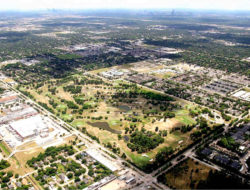 Tomorrow City Council is scheduled to approve a new municipal utility district for a proposed development on the Pine Crest Golf Course at Gessner and Clay Rd. in Spring Branch that would include enough new homes to house 800 residents. MetroNational is selling the 116-acre site to Meritage Homes. “The district would be served by the City’s regional plant, West District Wastewater Treatment Plant,” reads the agenda item. “The nearest major drainage facility for Harris County Municipal Utility District No. 552 would be Buffalo Bayou, which flows into the Houston Ship Channel.” [City Council; previously on Swamplot] Photo of Pine Crest Golf Course: Meritage Homes
Tomorrow City Council is scheduled to approve a new municipal utility district for a proposed development on the Pine Crest Golf Course at Gessner and Clay Rd. in Spring Branch that would include enough new homes to house 800 residents. MetroNational is selling the 116-acre site to Meritage Homes. “The district would be served by the City’s regional plant, West District Wastewater Treatment Plant,” reads the agenda item. “The nearest major drainage facility for Harris County Municipal Utility District No. 552 would be Buffalo Bayou, which flows into the Houston Ship Channel.” [City Council; previously on Swamplot] Photo of Pine Crest Golf Course: Meritage Homes
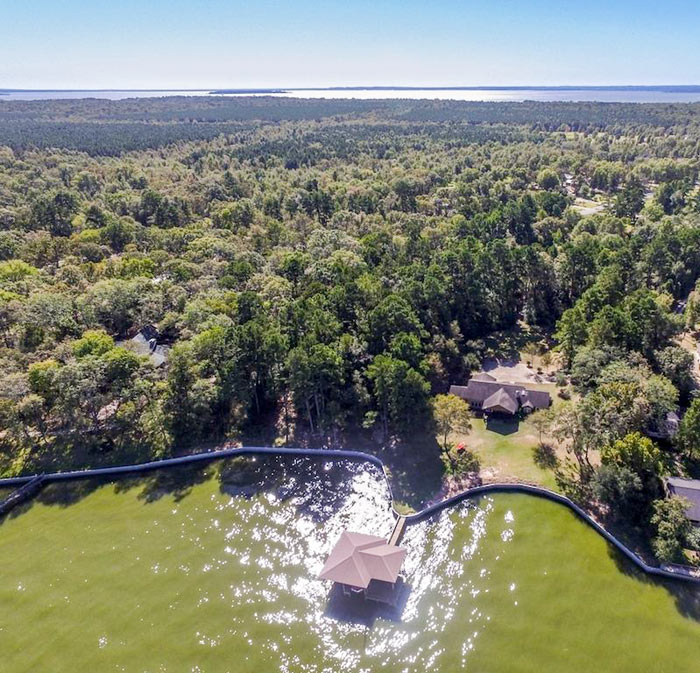
- 949 Commodore Dr. [HAR]
COMMENT OF THE DAY: WE TRIED THAT NO PARKING REQUIREMENTS THING BEFORE, IN AVONDALE 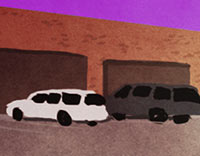 “The urban fantasists who don’t believe in minimum parking should school themselves on the economic concept of the free rider and the common law concept of nuisance. They should also research a little of the history behind Houston minimum parking requirements. These regs did not emerge in a vacuum.
I lived in Avondale, in Montrose, during the nineties, when it was home to no less than nine bars, multiple restaurants, and other adult businesses, all without parking and no parking requirements. Houston minimum parking requirements arose because of what was going on in Avondale and a few other neighborhoods inside the Loop.
The patrons of these bars and restaurants did not and still do not live within Avondale. They all drove to Avondale because there was and is still no other way to get there. The bar owners did not provide parking, choosing instead to impose the costs of their patron parking on the city and the residents of Avondale (free rider). The patrons parked, imbibed, and then proceeded to be drunken asses all night disturbing the peace of the neighborhood (nuisance).
Forcing the business owner to bear the costs of patron parking shifts the costs back to the business which benefits from the patronage. It is a reasonable requirement. It also alleviates the nuisance issue by keeping the drunks off the property of other businesses and residences.” [Jardinero1, commenting on Comment of the Day: What Parking Requirements for Bars Really Encourage] Illustration: Lulu
“The urban fantasists who don’t believe in minimum parking should school themselves on the economic concept of the free rider and the common law concept of nuisance. They should also research a little of the history behind Houston minimum parking requirements. These regs did not emerge in a vacuum.
I lived in Avondale, in Montrose, during the nineties, when it was home to no less than nine bars, multiple restaurants, and other adult businesses, all without parking and no parking requirements. Houston minimum parking requirements arose because of what was going on in Avondale and a few other neighborhoods inside the Loop.
The patrons of these bars and restaurants did not and still do not live within Avondale. They all drove to Avondale because there was and is still no other way to get there. The bar owners did not provide parking, choosing instead to impose the costs of their patron parking on the city and the residents of Avondale (free rider). The patrons parked, imbibed, and then proceeded to be drunken asses all night disturbing the peace of the neighborhood (nuisance).
Forcing the business owner to bear the costs of patron parking shifts the costs back to the business which benefits from the patronage. It is a reasonable requirement. It also alleviates the nuisance issue by keeping the drunks off the property of other businesses and residences.” [Jardinero1, commenting on Comment of the Day: What Parking Requirements for Bars Really Encourage] Illustration: Lulu
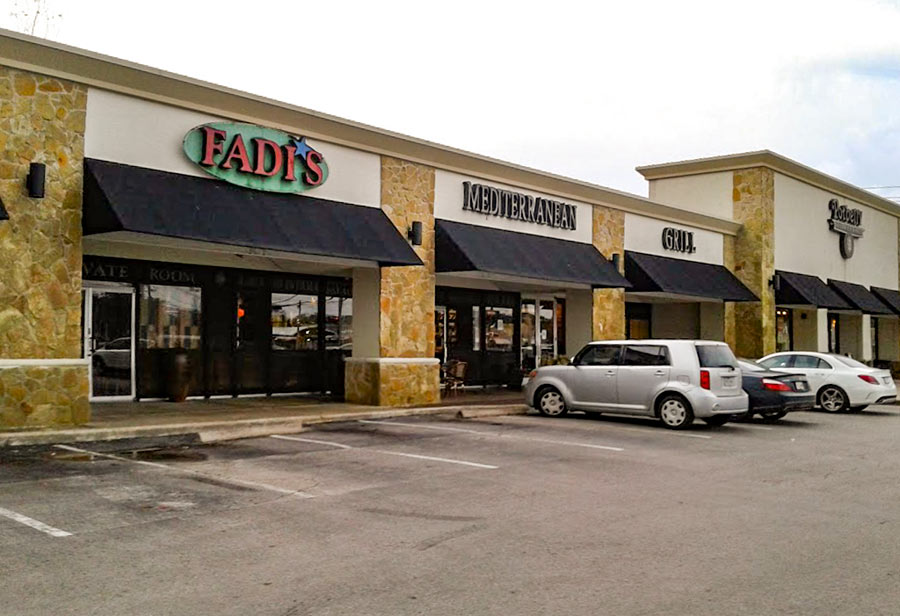
A 2-page letter posted to the front door of the Fadi’s Mediterranean Grill in the Westside Plaza shopping center at 8383 Westheimer on Friday explains that the landlord has terminated the lease on the property and is demanding the tenant pay close to $71,000 in back rent. Fadi Dimassi opened the first Fadi’s at this location in 1996; with this closing Fadi’s is now down to 8 locations, including 3 franchised spots in Dallas.
According to the letter, the lease term officially expired at the end of January. Since that time, Texadelphia has moved into the spot next door, replacing the Potbelly Sandwich shop shown in the photo above.
A Swamplot tipster notes the restaurant was open for business on Saturday but locked out on Sunday, with all tables, chairs, and restaurant property still inside. In an interview with the Houston Press in 2015, Dimassi noted that the $18,000-a-month rent his company was paying for the Dunvale location had spurred his interest in purchasing real estate for subsequent locations.
Photo:Â Miguel Paez
A LAKESIDE ESTATES HOME NOW WORTH ITS WEIGHT IN WATER 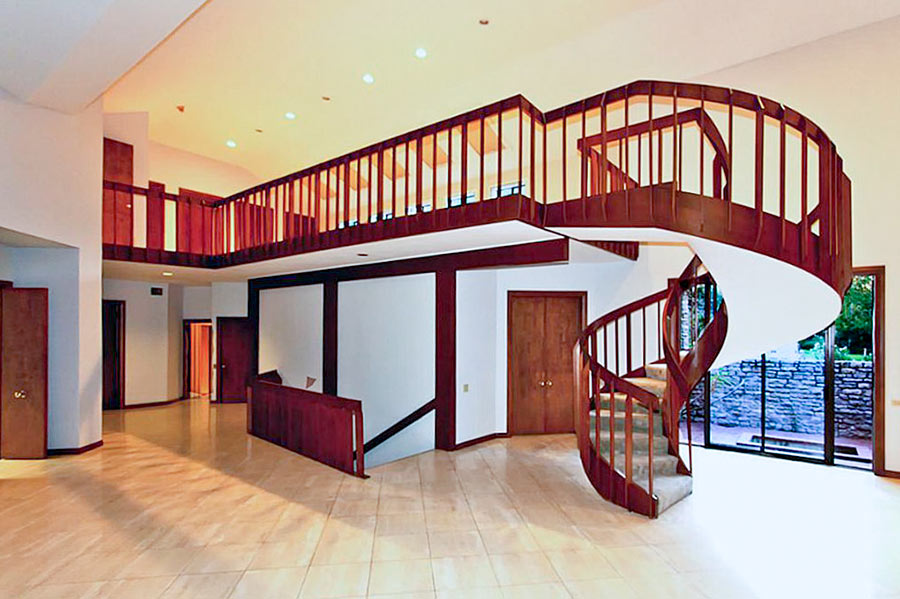 Before the Army Corps of Engineers straightened the section of Buffalo Bayou between Hwy. 6 and Beltway 8 in the mid 1960s, the cul-de-sac at the end of Riverview Dr. in Lakeside Estates wasn’t just near the waterway, it was in it. But the “view” and “side” in the names the subdivision’s developers later attached to the property east of Wilcrest Dr. as they built on it didn’t hold: “When [Allen] Wuescher says he had 17 feet of water inside his house, it’s one of those things you have to see to believe. It is the fifth time in 26 months that his house flooded, and the third time his entire first story was destroyed by water deep enough for a diving board,” writes Meagan Flynn. “Since the home was built in 1979, homeowners at this address have recouped more than $850,000 in flood damage losses through FEMA’s National Flood Insurance Program, at this point making the home more expensive to taxpayers just to exist than for the government to buy it and destroy it. It was appraised at $825,000 by the Harris County Appraisal District. The FEMA flood insurance loss payments so far don’t even include the extraordinary damage wrought by Harvey. And when we enter the home through Wuescher’s garage — which looks like a scene out of The Texas Chainsaw Massacre but with the lights on and with mold instead of blood — it’s immediately clear that the house really is not a house anymore.” [Houston Press] Photo of 10807 River View Dr. living room: Realtor.com
Before the Army Corps of Engineers straightened the section of Buffalo Bayou between Hwy. 6 and Beltway 8 in the mid 1960s, the cul-de-sac at the end of Riverview Dr. in Lakeside Estates wasn’t just near the waterway, it was in it. But the “view” and “side” in the names the subdivision’s developers later attached to the property east of Wilcrest Dr. as they built on it didn’t hold: “When [Allen] Wuescher says he had 17 feet of water inside his house, it’s one of those things you have to see to believe. It is the fifth time in 26 months that his house flooded, and the third time his entire first story was destroyed by water deep enough for a diving board,” writes Meagan Flynn. “Since the home was built in 1979, homeowners at this address have recouped more than $850,000 in flood damage losses through FEMA’s National Flood Insurance Program, at this point making the home more expensive to taxpayers just to exist than for the government to buy it and destroy it. It was appraised at $825,000 by the Harris County Appraisal District. The FEMA flood insurance loss payments so far don’t even include the extraordinary damage wrought by Harvey. And when we enter the home through Wuescher’s garage — which looks like a scene out of The Texas Chainsaw Massacre but with the lights on and with mold instead of blood — it’s immediately clear that the house really is not a house anymore.” [Houston Press] Photo of 10807 River View Dr. living room: Realtor.com
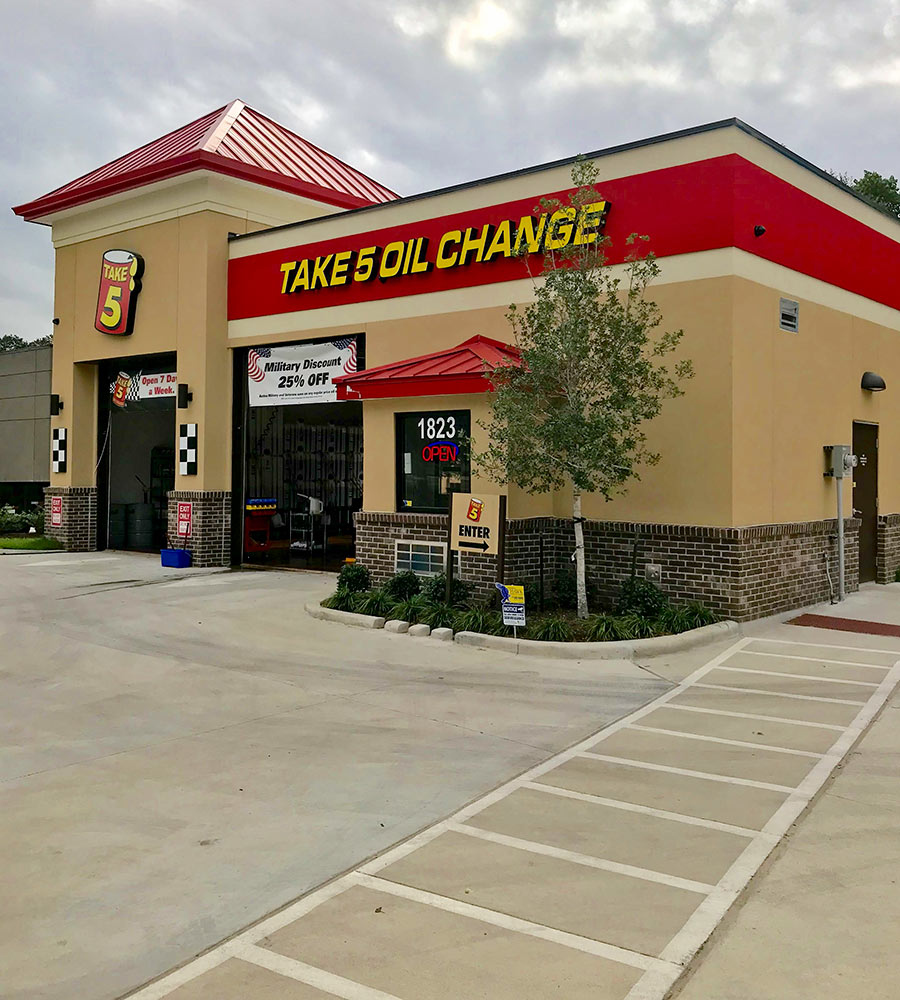
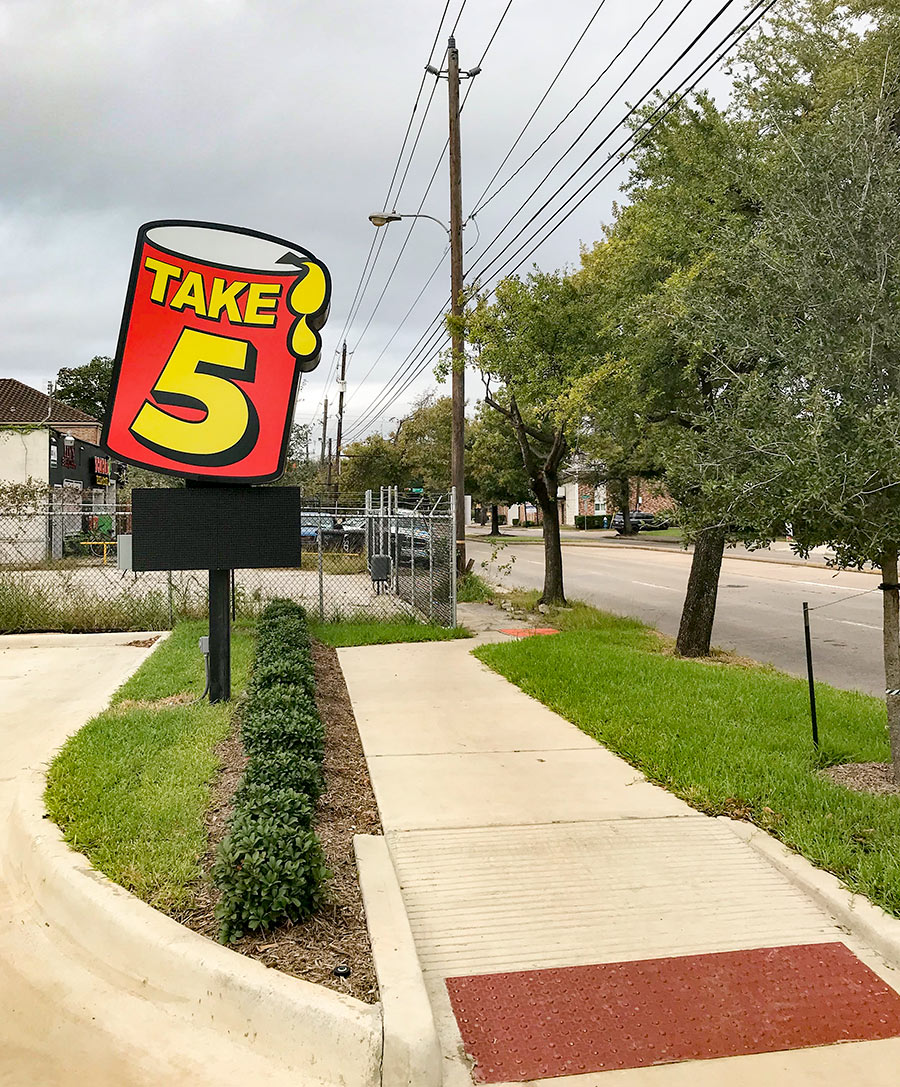 Here’s the other new purveyor of brownish fluids at the corner of Richmond Ave and Woodhead: The 13th area Take 5 Oil Change — and the chain’s fifth location in Houston proper — is now open for business, a few steps ahead of the adjacent new Starbucks. The building takes the place of a pair of 2-story brick 4-plexes at 1823 and 1827 Richmond torn down last year.
Here’s the other new purveyor of brownish fluids at the corner of Richmond Ave and Woodhead: The 13th area Take 5 Oil Change — and the chain’s fifth location in Houston proper — is now open for business, a few steps ahead of the adjacent new Starbucks. The building takes the place of a pair of 2-story brick 4-plexes at 1823 and 1827 Richmond torn down last year.
Take 5’s leaky-oil-can logo will greet drivers lined up for the Starbucks drive-thru, as this site plan shows:
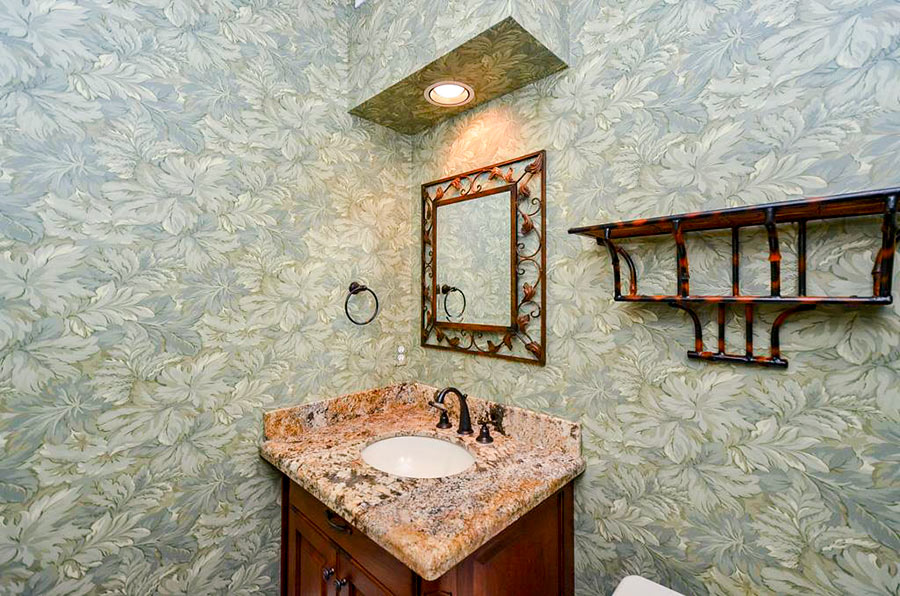
- 1112 Krist Dr. [HAR]
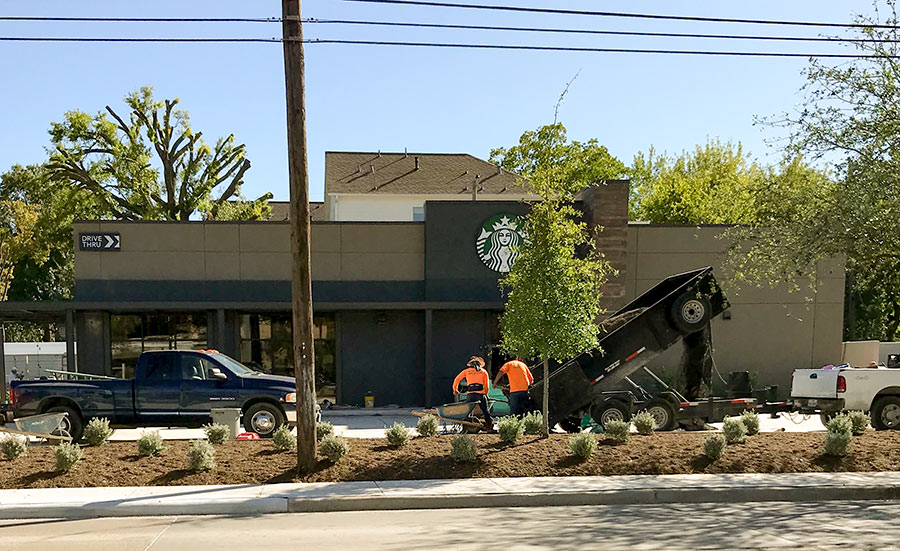
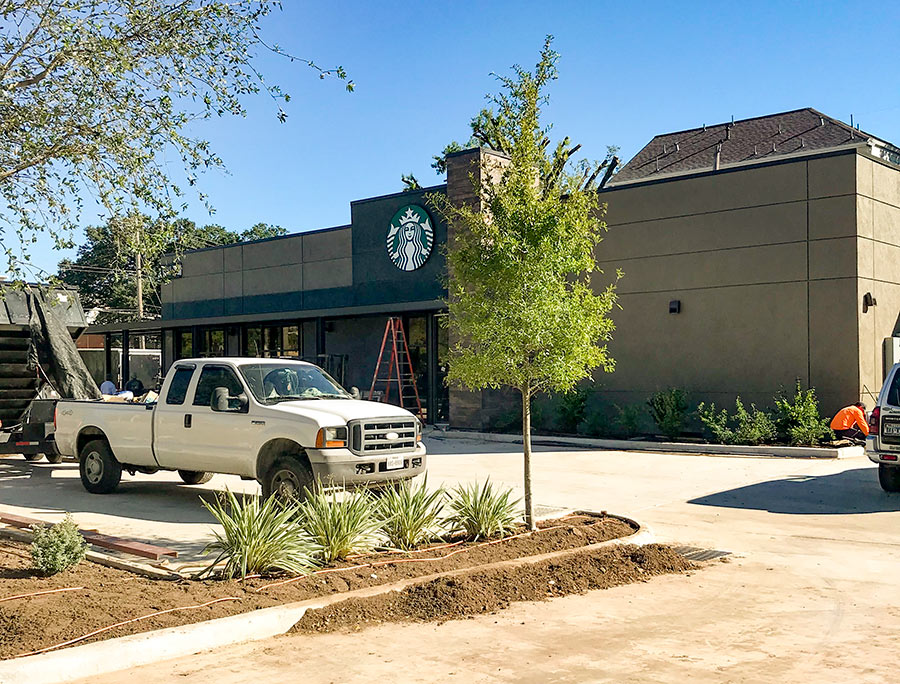
The mocha-colored drive-thru Starbucks that’s been brewing at 1801 Richmond Ave. since its predecessor building was torn down in January now appears just about ready to serve. Landscape crews are plopping in plants on the Richmond Ave. side; this view taken from an upper floor of the nearby Fairmont Museum District Apartments shows how the new building looks nestled next to its notable neighbors, which include the Big Tex Storage facility and King Cole liquor store across Richmond and Mexican restaurant La Tapatia just across Woodhead:
OCCASIONAL HAZARDS OF A FEEDER ROAD STRIP CENTER 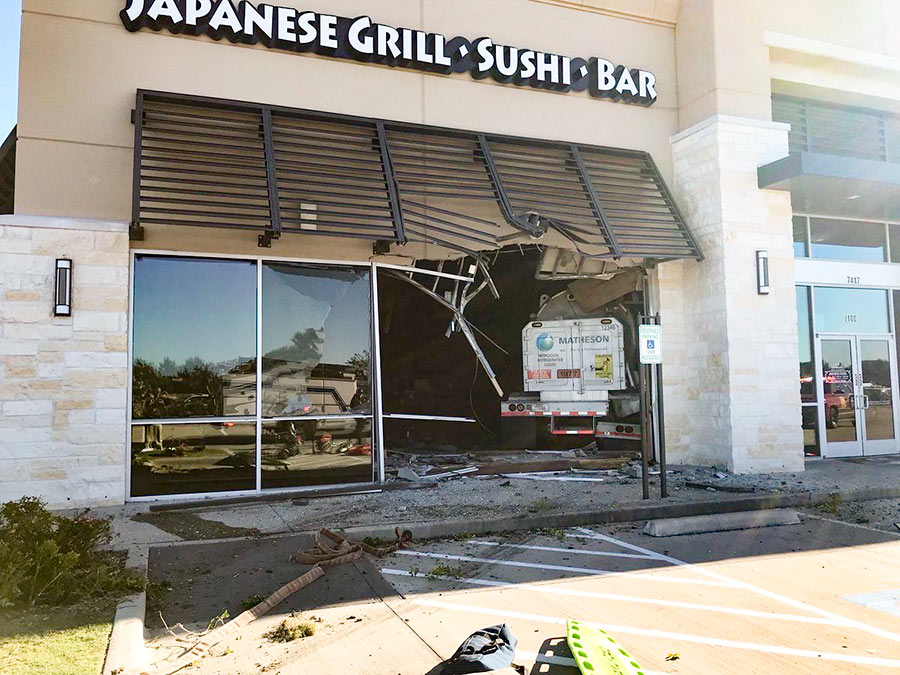 The Shogun Japanese Grill and Sushi Bar in a strip center fronting the northbound feeder of the Grand Parkway in Richmond opened its storefront involuntarily this morning to accept an oncoming 18-wheeler. The Fort Bend County Sheriff’s office has sent out the photo shown here of the restaurant at 7417 W. Grand Parkway South, showing the truck swallowed completely by the restaurant. The adjacent Gossip nail salon was also damaged after the truck broke through the interior wall separating the 2 businesses. According to the Sheriff’s office, the truck was carrying hazmat gasses; the words “nitrogen refrigerated liquid” are visible on the back of the trailer in the photo. The driver is in critical condition, and 3 people who were in the building suffered “minor injuries,” according to the report. The building has been evacuated. Update, 11:45 am: More from the Sheriff’s office: “The driver of the 18-wheeler has passed. We believe the crash was caused by a medical issue he was experiencing.” [FBCSO] Photo: Fort Bend County Sheriff’s Office.
The Shogun Japanese Grill and Sushi Bar in a strip center fronting the northbound feeder of the Grand Parkway in Richmond opened its storefront involuntarily this morning to accept an oncoming 18-wheeler. The Fort Bend County Sheriff’s office has sent out the photo shown here of the restaurant at 7417 W. Grand Parkway South, showing the truck swallowed completely by the restaurant. The adjacent Gossip nail salon was also damaged after the truck broke through the interior wall separating the 2 businesses. According to the Sheriff’s office, the truck was carrying hazmat gasses; the words “nitrogen refrigerated liquid” are visible on the back of the trailer in the photo. The driver is in critical condition, and 3 people who were in the building suffered “minor injuries,” according to the report. The building has been evacuated. Update, 11:45 am: More from the Sheriff’s office: “The driver of the 18-wheeler has passed. We believe the crash was caused by a medical issue he was experiencing.” [FBCSO] Photo: Fort Bend County Sheriff’s Office.
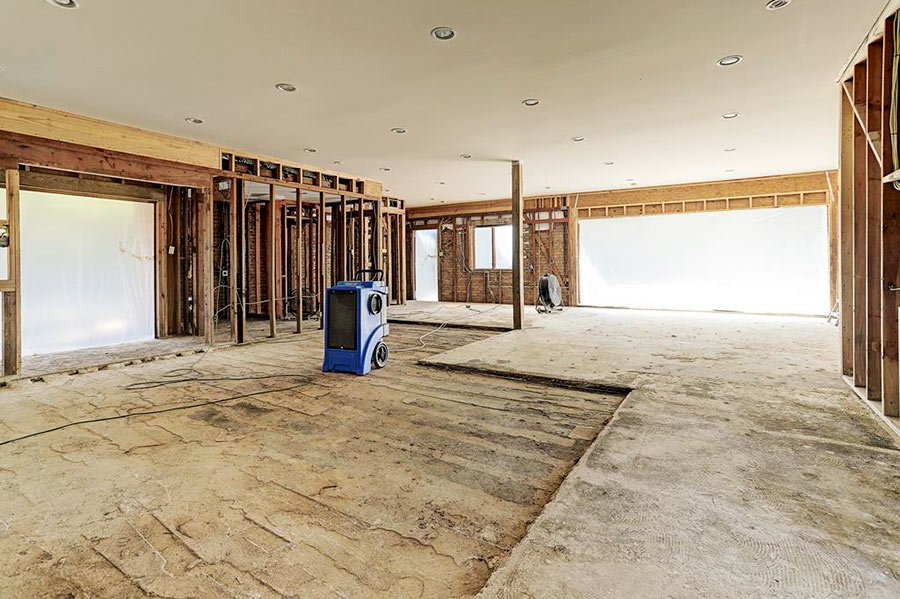
- 17 Legend Ln. [HAR]
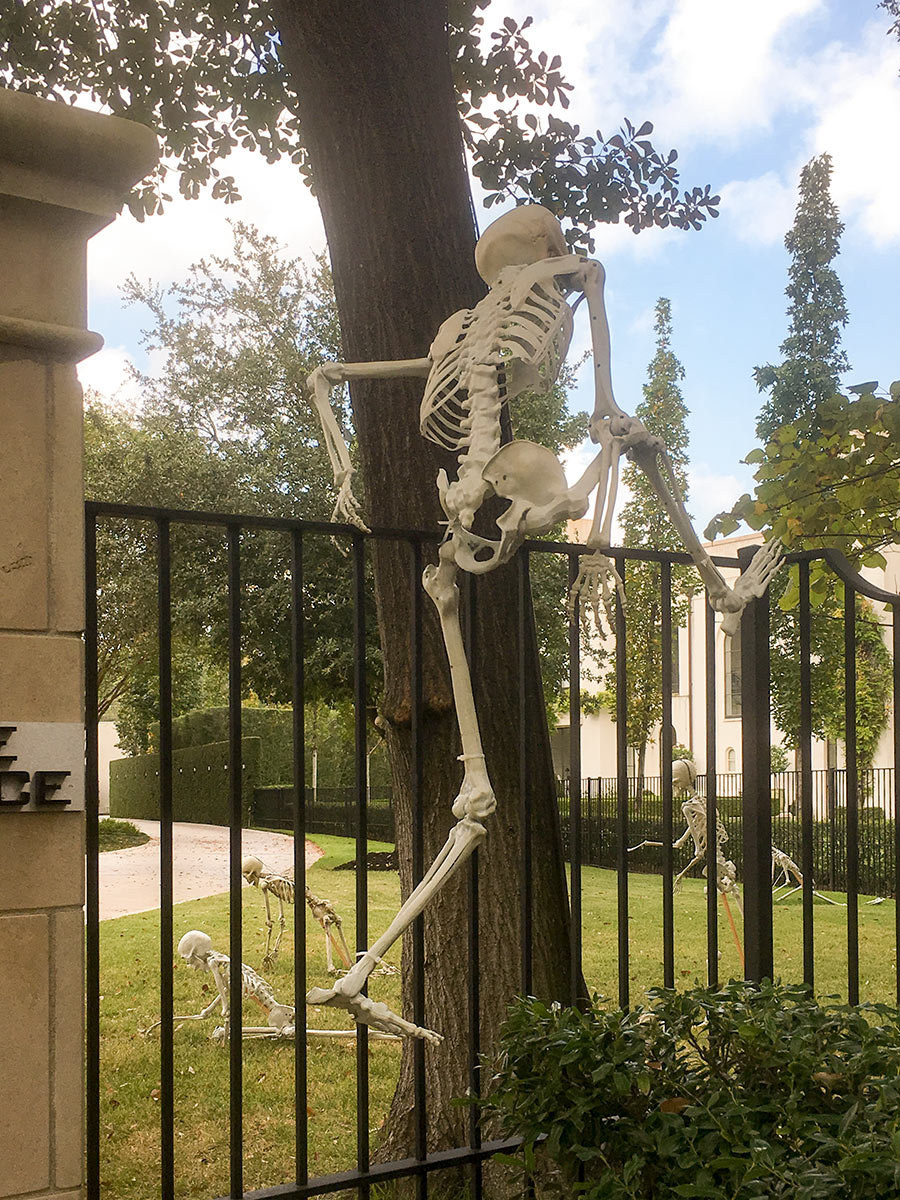
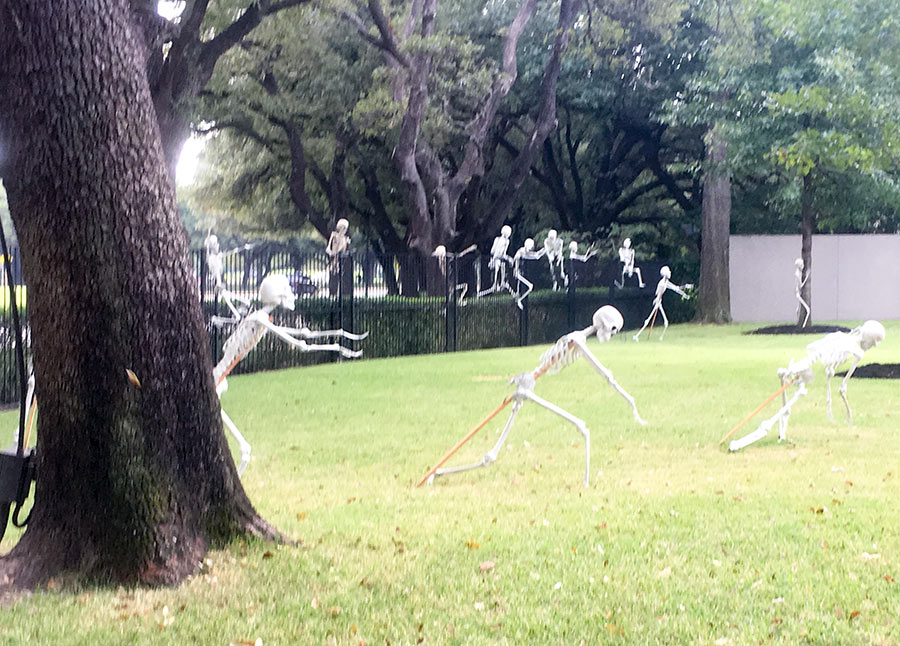
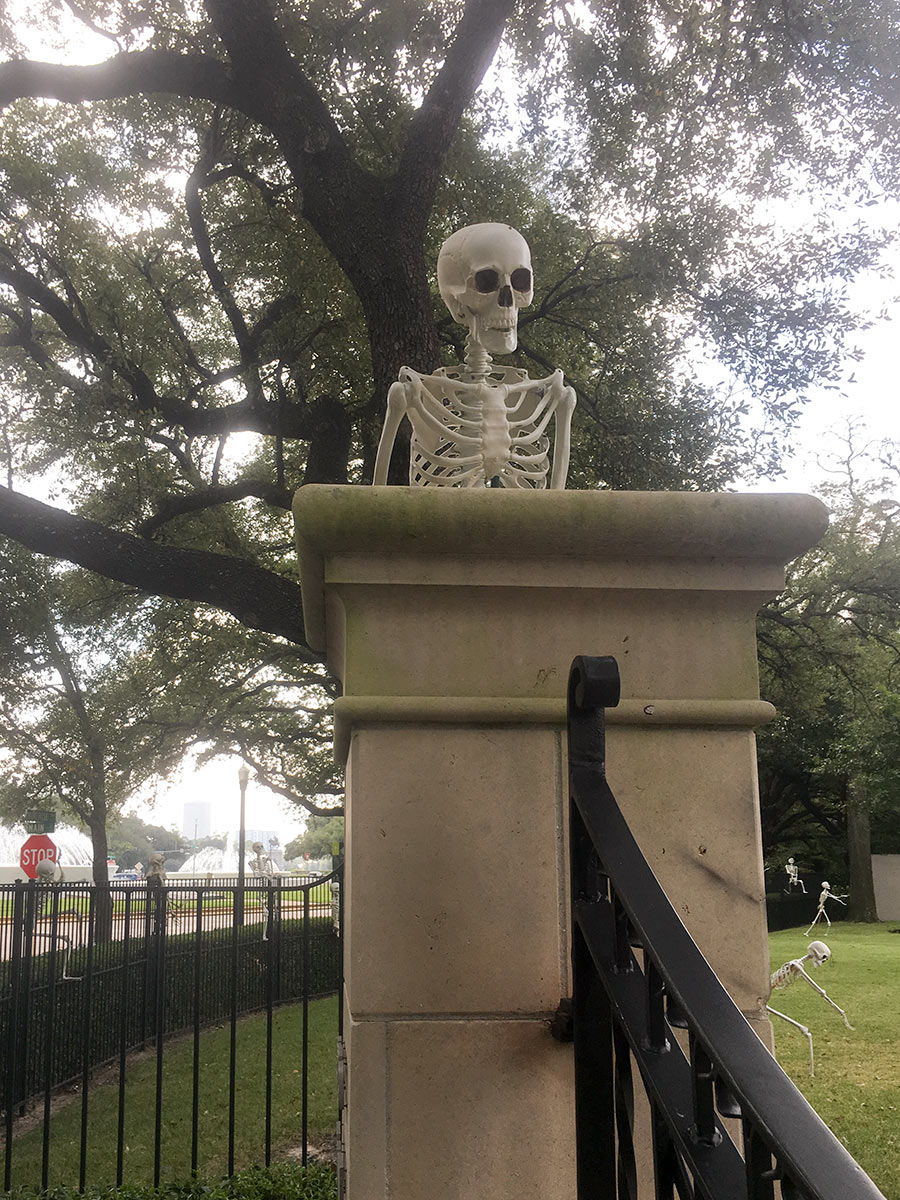 Folks are always dying to get in and get a peek inside prominent homes fronting major Houston intersections. And here, adjacent to the roundabout at the southern end of Montrose Blvd. surrounding the Mecom Fountain just north of Rice University across from the main entrance to Hermann Park, a Halloween-season folly has been showing off a fantasy reenactment of just that scenario.
Folks are always dying to get in and get a peek inside prominent homes fronting major Houston intersections. And here, adjacent to the roundabout at the southern end of Montrose Blvd. surrounding the Mecom Fountain just north of Rice University across from the main entrance to Hermann Park, a Halloween-season folly has been showing off a fantasy reenactment of just that scenario.
The tableau: Gotta-get-inside skeletons scale the security fences, crawl across the lawns, commandeer the topiary, and clamor for the entrance:
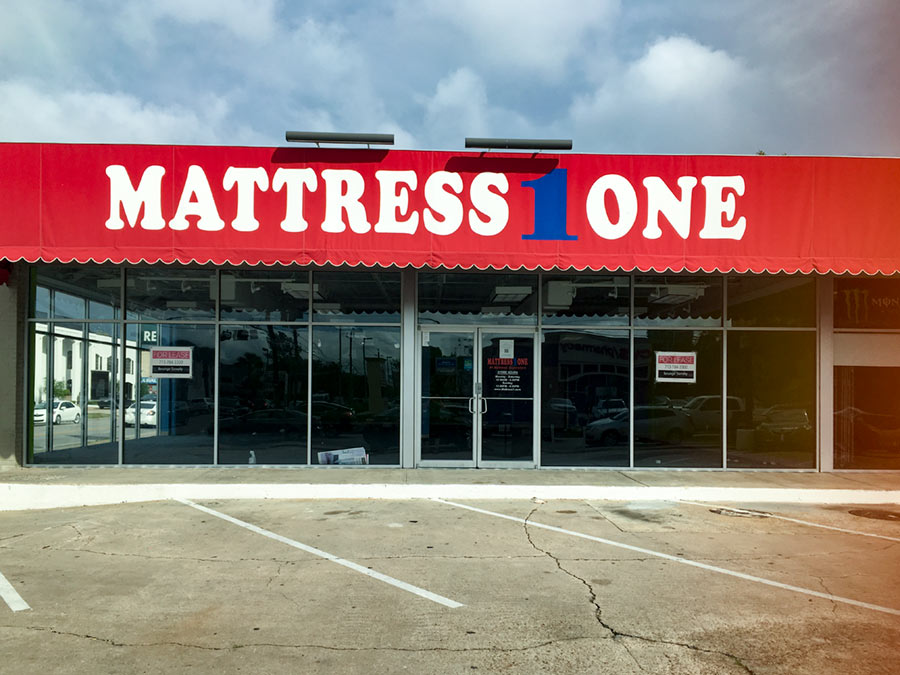
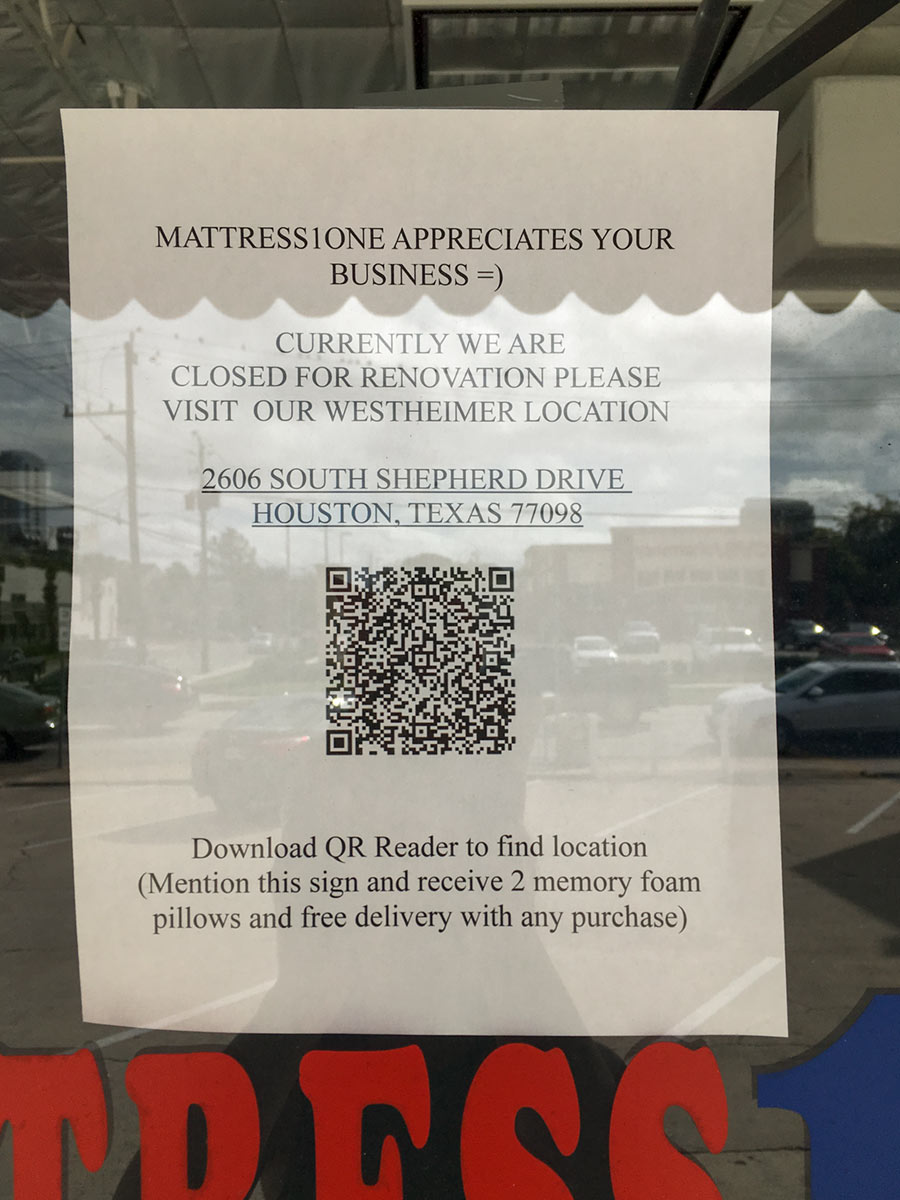 An intrepid mattress-store-monitoring reader notes that the Mattress 1 One (yeah, that’s how the company spells it out) in the northernmost spot of the strip center at S. Shepherd and W. Alabama across from CVS has closed down. Desperate mattress seekers need not worry, though: Plenty more outlets are available to pick up the slack. A note taped to the front door of the spot at 3101 S. Shepherd Dr., which despite the prominently placed Kensinger Donnelly FOR LEASE signs on the space insists that the location is only “closed for renovation,” directs would-be customers to the chain’s nearest still-open store: a full 3 blocks north on Shepherd, just south of Westheimer.
An intrepid mattress-store-monitoring reader notes that the Mattress 1 One (yeah, that’s how the company spells it out) in the northernmost spot of the strip center at S. Shepherd and W. Alabama across from CVS has closed down. Desperate mattress seekers need not worry, though: Plenty more outlets are available to pick up the slack. A note taped to the front door of the spot at 3101 S. Shepherd Dr., which despite the prominently placed Kensinger Donnelly FOR LEASE signs on the space insists that the location is only “closed for renovation,” directs would-be customers to the chain’s nearest still-open store: a full 3 blocks north on Shepherd, just south of Westheimer.
If that location doesn’t work for you, the Texas-and-Florida mattress chain lists a total of 16 Mattress 1 One locations within a 5-mile radius — though that includes the still-listed Shepherd-and-Alabama spot. And don’t forget competitor Mattress Firm, which has 18 locations of its own within that same area.
- Previously on Swamplot: Latest Addition Brings Mattress Store Count to 9 within Half a Mile of Rice Village;Â How It Came To Be That 2 Separate Mattress Stores with the Same Name Are Now Open Side by Side on Westheimer;Â Your Map to Houston Mattress Chain Stores;Â How and Where Mattress Firm Is Conquering Houston, One Sleepy Strip Center Storefront at a Time
Photos: Margo
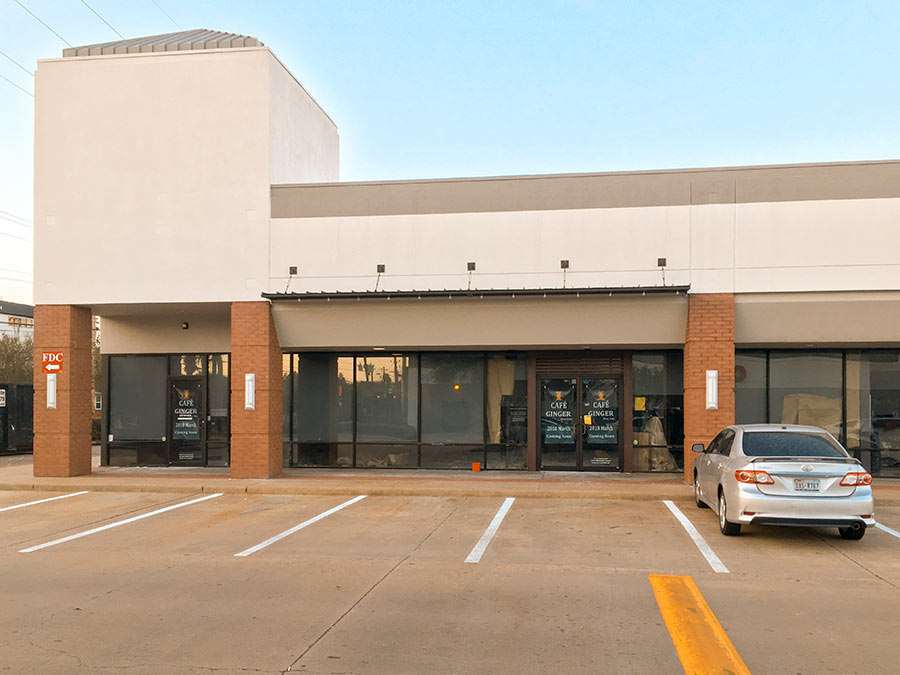
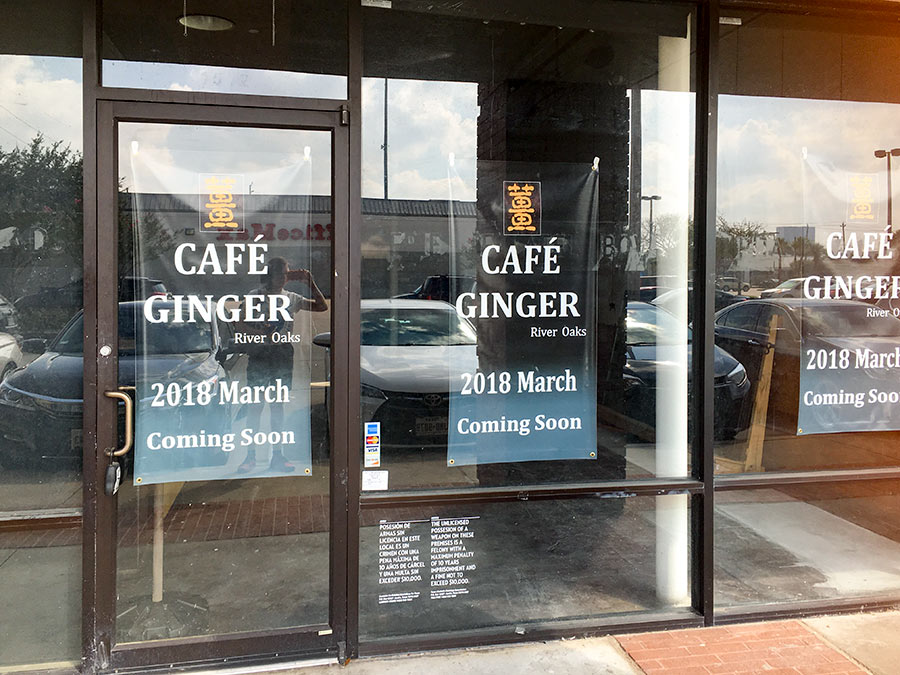
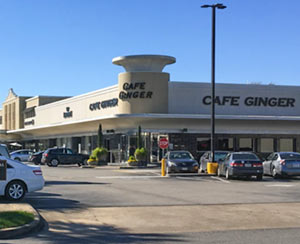 Café Ginger is already at work on its new outpost in its next West Gray St. shopping center corner, taking the places vacated by both Mama Fu’s and Verts Mediterranean Grill. The Chinese food and sushi restaurant arrived at its original and current spot at the eastern end of the northern half of the River Oaks Shopping Center 8 years ago, taking over from a restaurant whose addition to the center was marked by the tacking-on of a flying-saucer-like corner tower to the previously low-slung art deco center. At the new spot at 1574 West Gray, on the western end of River Oaks Plaza, the endcap corner tower is already in place — it was there when the center was constructed.
Café Ginger is already at work on its new outpost in its next West Gray St. shopping center corner, taking the places vacated by both Mama Fu’s and Verts Mediterranean Grill. The Chinese food and sushi restaurant arrived at its original and current spot at the eastern end of the northern half of the River Oaks Shopping Center 8 years ago, taking over from a restaurant whose addition to the center was marked by the tacking-on of a flying-saucer-like corner tower to the previously low-slung art deco center. At the new spot at 1574 West Gray, on the western end of River Oaks Plaza, the endcap corner tower is already in place — it was there when the center was constructed.
But inside, there’s more construction to do: As new signs on the doors announce, the new location is scheduled to open in March of next year. That’s the same month Weingarten Realty plans to hold the groundbreaking for the Driscoll tower — directly on top of Café Ginger’s current spot.
- Construction date set for River Oaks Shopping Center residential tower [Houston Business Journal]
- Previously on Swamplot: Café Ginger To Move Into Mama Fu’s Place Some Time Before the Highrising Starts
Photos: Margo (River Oaks Plaza); Katie Schon (River Oaks Shopping Center)
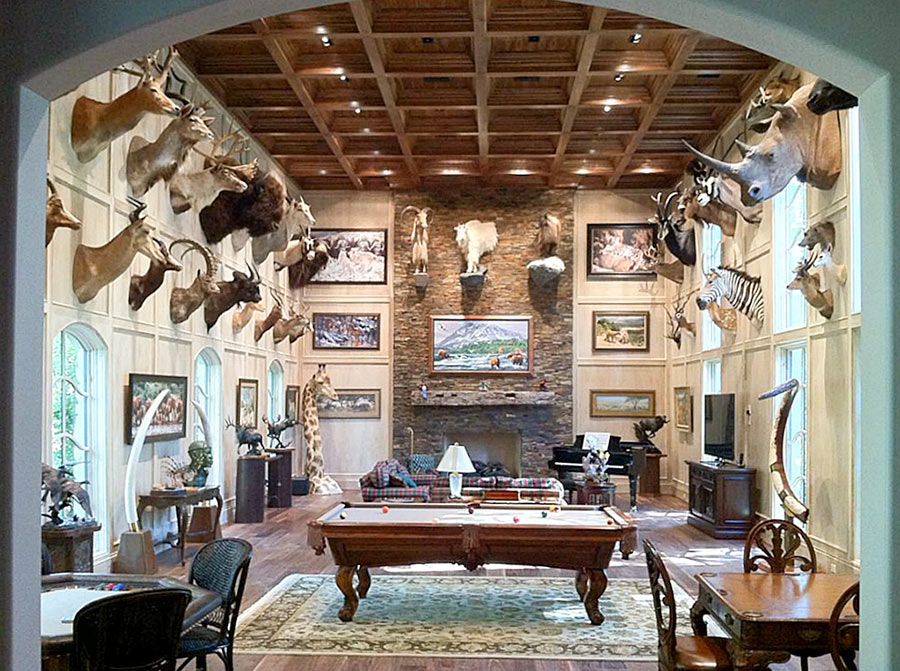
- 12 Legend Ln. [HAR]

